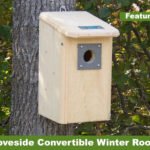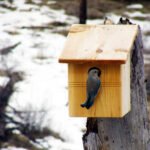Woodpeckers are unique and beautiful birds that are a treat to have in the backyard. Because of the majesty of the birds, some people do anything to attract woodpeckers, such as putting out suet feeders, planting deciduous and coniferous trees, and mounting nesting cavities, so you might find it surprising that a small portion of people will do anything just to get woodpeckers away from their house.
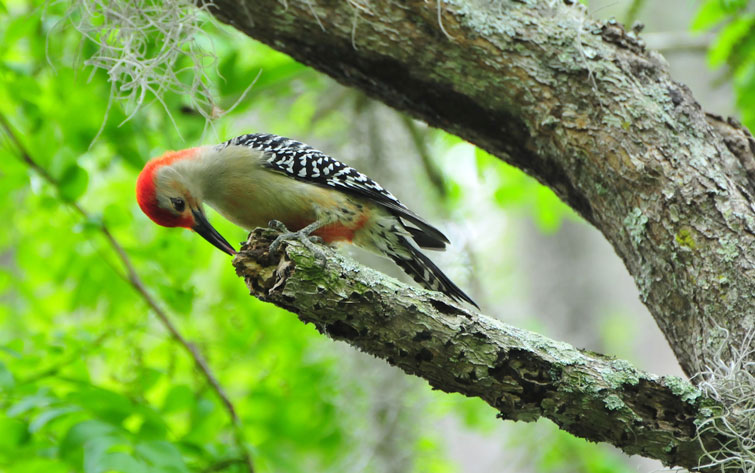
Woodpeckers can actually do quite a bit of damage to your home and cause major annoyances with their constant drumming and pecking. If you’re one of the unlucky few whose home is being tormented by woodpeckers, here are some things that will help.
Why is a woodpecker damaging my house?
No, woodpeckers aren’t maliciously targeting your home with the intent to destroy it because you didn’t put out their favorite suet cake yesterday. There are actually three very good and natural reasons why a woodpecker might be pecking away at your house and causing damage.
1) Drumming. The first reason why a woodpecker may be pecking at your house is to attract a mate. This type of pecking, commonly known as drumming, manifests itself in quick, machine-gun bursts. A male uses this loud noise to mark his territory to other males and attract a female. The damage is usually superficial.
2) Eating. Woodpeckers don’t eat wood like termites, but woodpeckers do eat termites. A common reason why woodpeckers damage a home is because they’re eating insects that are living in your boards. If you notice small holes or pieces of wood chipped away, this is likely the reason why a woodpecker is pecking at your house. According to Audubon, carpenter bees and beetles will often drill holes in wood and lay eggs. The woodpeckers are merely getting in there to eat the larvae.
3) Nesting or Roosting. If a woodpecker seems to be trying to make a large hole in your siding, it probably thinks your house makes a great nesting or roosting site. This behavior causes the most damage because the woodpecker is trying to excavate a hole big enough for it to fit inside. To get it to leave, try some of the methods in the next section.
How do I get woodpeckers to stop pecking at my home?
The method you use to discourage a woodpecker from pecking on your house largely depends on the reason they are there. Still, here are some effective measures you can take for stopping woodpeckers from damaging your house.
Offer woodpeckers food
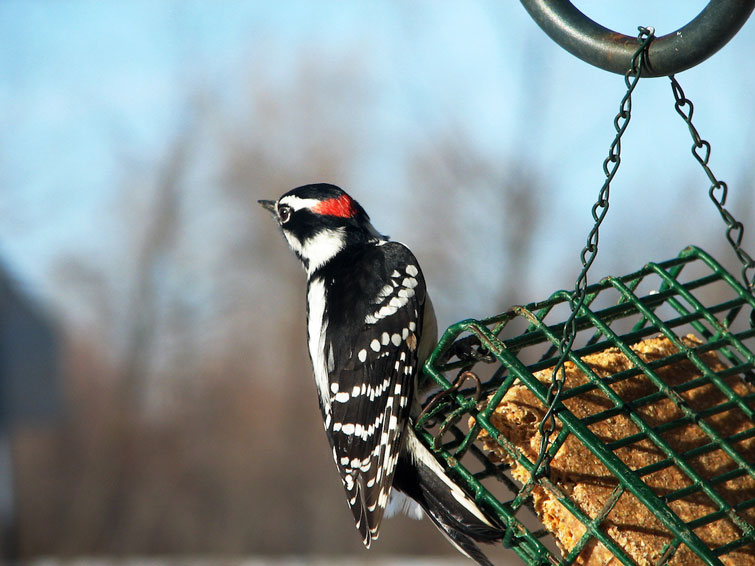
If woodpeckers are making small holes in your siding, they’re likely trying to get insects out of the wood. Offering food that’s easier to access will often keep the woodpeckers out of your siding and on your bird feeders. Suet feeders are a great choice because woodpeckers have a varied diet.
Contact pest control
If you put out suet and the woodpeckers are still going after the bugs in your wood, it’s a good idea to contact a pest control company. Not only do these bugs attract hungry woodpeckers but the bugs themselves can also cause damage.
Provide alternatives for drumming
When a woodpecker’s drumming is the main cause of damage or noise, giving them an alternative place to present themselves to females is an easy solution. Simply propping up a stump or hollow branches is enough to get the woodpeckers to move where you want.
Hang metal objects
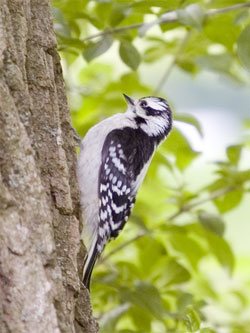
To scare away woodpeckers that are pecking at your house for any reason, hang shiny objects that reflect light. Hanging something like a metal pie plate from a string will typically be enough to frighten nearby woodpeckers.
Fix or cover troubled areas
Loose or broken portions of the house often cause the most trouble because that’s usually where insects get in and drumming sounds the best. By repairing these areas or covering them, you can discourage woodpeckers.
Provide a woodpecker nest box
For the woodpeckers trying to make your home their home, offer them another place to set up a nest by installing a woodpecker nest box. Make sure you get one the appropriate size for the woodpecker in question and place it near the area of your home they were trying to excavate.
Finally, remember that woodpeckers are protected under the Migratory Bird Act, so it is against the law to capture them or remove their eggs from a nesting location.


